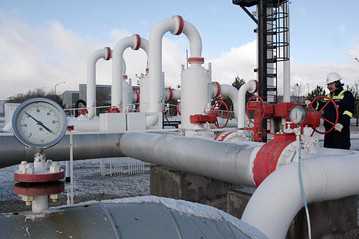TEHRAN – The flow of Iranian gas to Turkey restarted on Friday afternoon after an eight-day halt, the Mehr news agency reported.
 On Thursday, Turkey’s state-run Botas Petroleum Pipeline Corporation requested Iran to suspend temporarily exporting gas for inspecting the pipeline and conducting necessary repairs.
On Thursday, Turkey’s state-run Botas Petroleum Pipeline Corporation requested Iran to suspend temporarily exporting gas for inspecting the pipeline and conducting necessary repairs.
Before the halt, Iran exported 30 million cubic meters per day of natural gas to Turkey via the pipeline.
In recent months, some explosions in Iran’s natural gas transmission line to Turkey temporarily disrupted gas supplies to Iran’s western neighbor.
Previously, the National Iranian Gas Company urged Turkey to compensate for repeating delay in repairing the Iran gas importing pipeline and decreasing gas imports from Iran.
The Mehr news agency reported on Tuesday that the repeated explosions of the Iran-Turkey gas pipeline in the Turkey’s territory have decreased Iran’s gas exports to Turkey sharply in recent months.
On the other hand, Turkey was buying additional gas from Azerbaijan and Russia to cover the shortfall caused by the explosion.
According the 25-year agreement between two countries, Iran is obliged to supply Turkey with annually 10 billion cubic meters of natural gas and if either side fails to fulfill its commitment, it is liable for compensation.
Mehr quoted economic experts as saying Turkey was not rushing to re-open the pipeline as it was benefiting from importing cheaper Russian gas and would cite force majeure for the closure, allowing it to avoid paying compensation for the problem.
In 2009, Turkey paid 600 million dollars fine to Iran because of importing less than the agreed amount of gas from Iran.
On Sunday, for the fourth times in 2011, the National Iranian Gas Company stopped gas exports to Turkey upon the request of the Ankara’s state-owned oil and gas company BOTAS.
In August an explosion in the Turkish eastern province of Agri damaged a section of the gas pipeline between Iran and Turkey, disrupting the supply of natural gas between the two countries.
In July another explosion in Iran’s natural gas transmission line to Turkey temporarily disrupted gas supplies to Iran’s western neighbor.
According to reports, Iran exports a daily average of more than 30 million cubic meters of natural gas to Turkey, which indicates a daily growth of 11 million cubic meters in comparison to 2010.
In 2009, Iran exported an average of 21 million cubic meters of natural gas to Turkey per day. The value of Iran’s gas exports to Turkey in 2009 was almost USD 7 billion.
Iran is Turkey’s second-biggest supplier of natural gas after Russia, sending 10 billion cubic meters of gas each year. Turkey uses gas to fire half of its power plants.
via Iran resumes gas exports to Turkey – Tehran Times.


